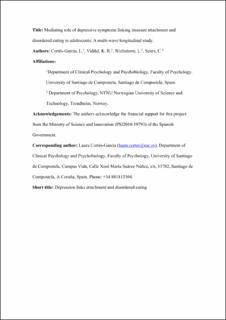Mediating role of depressive symptoms linking insecure attachment and disordered eating in adolescents: A multiwave longitudinal study
Peer reviewed, Journal article
Accepted version
Permanent lenke
https://hdl.handle.net/11250/2825927Utgivelsesdato
2020Metadata
Vis full innførselSamlinger
- Institutt for psykologi [2970]
- Publikasjoner fra CRIStin - NTNU [37703]
Sammendrag
Research has supported a link between insecure attachment and disordered eating in adolescents; however, how this influence is exerted remains unclear. This study explored whether depressive symptoms constitute a pathway through which insecure attachment to parents predicts subsequent development of disordered eating in the transition from childhood to adolescence. The study also examines whether there are differential effects regarding the attachment figure, child's gender, or reciprocity between variables. A community-based sample of Spanish youth (n = 904; 49.4% girls) was followed biennially from age 10 to 16 years. Attachment, depressive symptoms, and disordered eating were measured using the Inventory of Parental and Peer Attachment, Children's Depression Inventory, and Children's Eating Attitudes Test, respectively. Prospective data were analyzed using a dynamic panel model, which accounts for unmeasured time-invariant factors. Whereas insecure attachment to the father did not predict later depression or disordered eating, higher insecure attachment to the mother at ages 10 and 12 years predicted more disordered eating at ages 14 and 16 years via increased depressive symptoms at ages 12 and 14 years. No child's gender-specific or reverse mediational effects were found. This study suggests that an increase in depressive symptoms might be one mechanism by which insecure attachment exerts its influence on the development of eating disorders symptomatology in adolescence. Intervention efforts aimed at strengthening particularly the mother–child attachment relationship may reduce the vulnerability to develop depressive symptoms and disordered eating.
